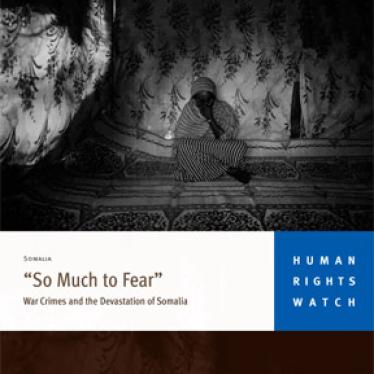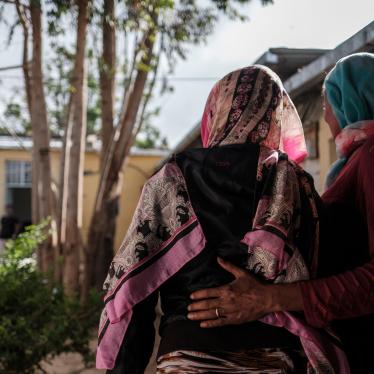(New York) - The Islamist armed group al-Shabaab is subjecting inhabitants of southern Somalia to killings, cruel punishments, and repressive social control, Human Rights Watch said in a report released today. Al-Shabaab, the Transitional Federal Government (TFG), and African Union (AU) forces in the war-torn capital, Mogadishu, continue to conduct indiscriminate attacks, killing and wounding numerous civilians.
The 62-page report, "Harsh War, Harsh Peace: Abuses by al-Shabaab, the Transitional Federal Government, and AMISOM in Somalia," finds that al-Shabaab forces have brought greater stability to many areas in southern Somalia, but at a high cost for the local population - especially women. Based on over 70 interviews with victims and witnesses, the report describes harsh punishments including amputations and floggings, which are meted out regularly and without due process. People accused of being traitors or government sympathizers - often on flimsy pretexts - face execution or assassination. Al-Shabaab fighters had threatened some of those interviewed with death simply because they lived in government-controlled areas of Mogadishu.
"While al-Shabaab has brought stability to some areas long plagued by violence, it has used unrelenting repression and brutality," said Georgette Gagnon, Africa director at Human Rights Watch. "The population under al-Shabaab's control is paying a very steep price."
Key international actors have often played a counterproductive role in the crisis and have played down abuses by AU troops deployed to Mogadishu to protect Somalia's weak transitional government, Human Rights Watch said.
Many local al-Shabaab authorities devote extraordinary energy to policing the personal lives of women and preventing any mingling of the sexes. Several women told Human Rights Watch that they had been beaten, flogged, or jailed for selling tea to support their families because the work brought them into contact with men. In other cases, women were beaten for failing to wear the precise type of abaya - a bulky head-to-toe garment - prescribed by local edicts. Women often fail to wear the abaya not out of defiance but because their families simply cannot afford them.
"He was raising his hand back and counting, ‘One, two, three, four, five .... '" one woman told Human Rights Watch, describing the beating she got when she ran out of her house after her toddler without an abaya. "It felt so painful that if I had a gun I would have killed that man."
Al-Shabaab has subjected young men and boys to abuses that include forced military recruitment and strict social control. Human Rights Watch interviewed one young man who saw his uncle murdered by al-Shabaab fighters because he refused to reveal the whereabouts of another nephew, a 15-year-old, who had deserted their ranks after being wounded in combat. Beatings or public humiliations are commonly meted out to men for a broad range of offenses such as failing to go to mosque, having long hair, or wearing clothes that al-Shabaab considers Western.
"Alongside abuses in al-Shabaab-controlled areas, all sides are responsible for laws-of-war violations that continue unabated in Mogadishu," Gagnon said. "Many Somalis confront indiscriminate warfare, terrifying patterns of repression, and brutal acts of targeted violence on a daily basis."
In Mogadishu, the transitional government and the 5,300-member African Union Mission in Somalia (AMISOM) are squared off against a powerful opposition dominated by al-Shabaab.
Opposition fighters regularly fire mortar rounds indiscriminately into populated neighborhoods controlled by the transitional government. They frequently fire from residential areas in apparent hope of attracting retaliatory attacks that will damage the image of the transitional government and AU forces. All too often these forces oblige, responding to indiscriminate attacks in kind. AU forces have fired mortar shells into densely populated areas without taking precautions to discriminate between civilians and military targets. Human Rights Watch interviewed people on both sides of the lines who witnessed family members being torn to pieces in such attacks, which violate the laws of war.
Al-Shabaab and other opposition fighters threaten and kill civilians they see as sympathetic to the transitional government. Al-Shabaab has also carried out devastating suicide attacks against civilians, including one at a university graduation ceremony in Mogadishu that killed at least 22 people in December 2009.
The intervention of outside powers in Somalia has often proved counterproductive to restoring security. The strong backing for the transitional government by the US, the EU, the AU, and the UN Political Office for Somalia has led these actors to quickly condemn serious abuses by al-Shabaab, but effectively turn a blind eye to abuses by transitional government and AU forces. The US government has sent mortars to transitional government forces in Mogadishu even though no party to the fighting has used the weapons in accordance with the laws of war.
Neighboring Kenya has under false pretenses helped recruit Somali youths from refugee camps to be fighters, contravening the humanitarian status of the camps. Eritrea, in an effort to undermine the regional interests of its political foe, Ethiopia, has helped al-Shabaab procure weapons. Human Rights Watch urgently calls on foreign actors to re-evaluate their policies toward Somalia and help end the impunity that fuels the worst abuses.
"There is no easy, obvious way to solve the crisis in Somalia," Gagnon said. "But outside powers should address abuses by all sides instead of ignoring those committed by their allies."
Somalia has been plagued by armed conflict since the collapse of its last functioning government in 1991. But the situation dramatically worsened in late 2006, when Ethiopian military forces intervened to smash a coalition of Sharia (Islamic law) courts that had taken control of Mogadishu.
The resulting conflict pitted Ethiopian forces and their transitional government allies against an array of insurgent groups, including al-Shabaab, who sprang up to fight them. The fighting devastated Mogadishu, drove hundreds of thousands of Somalis from their homes, and spawned a massive humanitarian crisis that continues to worsen. Ethiopian forces withdrew by the beginning of 2009, but the violence continues unabated.
Quotes from Victims and Witnesses Interviewed in "Harsh War, Harsh Peace":
"My husband was then asked, 'Are you going to take the 10 lashes normally prescribed for women who are supposed to wear the abaya?' He refused, and they said, 'Okay, then your wife will take it.' A young man gave me 10 lashes with the whip. He beat me so much that I felt heat and pain throughout my body. He was raising his hand back and counting, 'One, two, three, four, five .... ' It felt so painful that if I had a gun I would have killed that man."
- Woman from Mogadishu who had been chasing after her toddler who had wandered from her house to the street, and was arrested by al-Shabaab fighters for failing to don her abaya.
"If they find you without [an abaya], they will beat and flog you. This happened to me two months ago. I was standing in front of my compound. When I saw them with whips and guns, I rushed back inside. But a man chased me and whipped me three times. He used a stick from a marer [a berry tree]. He said, 'Why are you not wearing a hijab?' I said, 'I cannot afford it.' He said, 'That is not possible; get into your house.' So you either have to have it or stay in your house, hungry."
- Woman from a farm near the town of Jilib, north of Kismayo.
"One day when I came home from duksi [Quranic school] I found our house had been hit by a [mortar shell]. The house was pulverized. My mother and father were killed. I think my four brothers were killed as well - I saw pieces of their hands and legs near the part of the house that we used for resting. I am in such shock, I barely know who I am."
- 14-year-old boy whose family in Mogadishu was wiped out by a mortar strike in September 2009.
"They [al-Shabaab] use mortars. They sit at a specific place and launch one, five, or even ten mortar rounds. Then they pack and go immediately. We have no way to complain to them [and tell them to stop]. Even if you look at them, you can be killed. Now a counterattack comes, without discrimination. One day some of my relatives were buried in their house after a mortar hit a nearby house - three people died there. My house was blocked by the rubble of that house. We had to dig them out."
- Former resident of an opposition-controlled neighborhood of Mogadishu.









